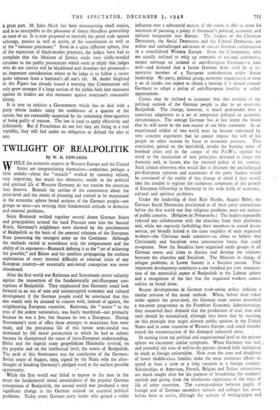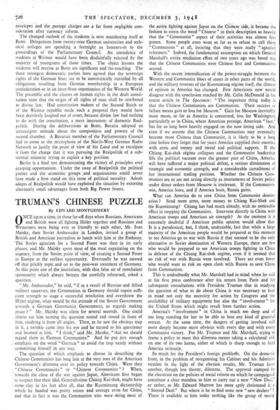TWILIGHT OF REALPOLITIK
By W. H. EDWARDS
VVHILE the economic experts in Western Europe and the United States are congratulating themselves—sometimes perhaps a little unduly—about the "miracle" worked by currency reform, very important, but much less obtrusive, trends in the political and spiritual life of Western Germany do not receive the attention they deserve. Beneath the surface of the controversy about the price-level and the extent of planning and control to be maintained in the economic sphere broad sections of the German people—not groups or sects—are revising their fundamental attitude to domestic and external problems.
Since Bismarck welded together several dozen German States and principalities around the hard Prussian core into the Second Reich, Germany's neighbours were alarmed by the proclamation of Realpolitik as the basis of the external relations of the European State possessing the strongest army on the Continent. Although the methods varied in accordance with the temperament and the ability of its exponents—Bismarck defining it as the "art of achieving the possible," and Billow and his satellites propagating the ruthless exploitation of every internal difficulty or external crisis of any European country—an essentially anti-moral conception was never abandoned.
After the first world war Rathenau and Stresemann strove valiantly against the reassertion of the fundamentally anti-European con- ceptions of Realpolitik. They emphasised that Germany could look forward to an era of sane and uninterrupted economic and cultural development if the German people could be convinced that this aim would only be attained in concert with, instead of against, the neighbouring European countries. Rathenau, the " traitot " in the eyes of the ardent nationalists, was foully murdered—not primarily because he was a Jew, but because he was a European. During Stresemann's term of office three attempts to assassinate him were made, and the precarious life of this heroic semi-invalid was shottened by the moral persecution to which he had to submit because he championed the cause of intra-European understanding. Hitler and the slightly crazy geopolirkian Haushofer revived, on the popular and on the intellectual level, the tenets of Realpolitik. The peak of this knaissance was the conclusion of the German- Soviet treaty of August, 1939, signed by the Nazis with the after- thought of breaking Germany's pledged word at the earliest possible opportunity.
While the first world war failed to expose to the man in the street the fundamental moral unsoundness of the popular German conceptions of Realpolitik, the second ',world war produced a very significant change in the German outlook on essential political problems. Today every German party leader who gained a stable
influence over a substantial section of the voters is able to avow his intention of pursuing a policy of Germany's political, economic and cultural integration into Europe. The leaders of the Christian Democrats, the Social Democrats and the Liberal Democrats are ardent and unchallenged advocates of sincere German collaboration in a consolidated Western Europe. Even the Communists, who are usually inclined to whip up remnants of national sentiments, cannot envisage an isolated or anti-European Germany—a lone wolf—and demand that a future German State shall be a co- operative member of a European confederation under Soviet leadership. No party, political group, economic organisation or even a set of cranks can expect to obtain a hearing if it should counsel Germany to adopt a policy of anti-European hostility or selfish opportunism.
Cynics may be inclined to insinuate that this revision of the political outlook of the German people is due to an economic Realpolitik. The change, however, is much profounder than a transitory adaptation to a set of temporary political or economic circumstances. The average German has at last learnt the lesson that he will never be the sole master of our little continent. As an experienced soldier of two world wars he became convinced by very concrete arguments that he cannot impose the will of his people on other nations by force or economic pressure. This conviction, gained on the battlefield, amidst the burning ruins of bombed cities and in the camps of the P.o.W.s, opened his mind to the inculcation of new principles destined to shape the domestic and, in future, also the external policy of his country. Such cynical observers who would like to discount the unchallenged pro-European opinions and statements of the party leaders would be convinced of the reality of this change of mind if they would take the trouble to register the numerous symptoms of the growth of European fellowship in Germany in the wide fields of economic, cultural and spiritual problems.
Under the leadership of their Keir Hardie, August Bebel, the German Social Democrats proclaimed at all their party conventions before the first world war that religious problems were not matters of public concerti. (Religion in Privatsache.) The leaders repeatedly rejected any collaboration with the churches from their platforms and, while not expressly forbidding their members to attend divine service, yet broadly hinted at the crass stupidity of such organised workers—the Christian trade unionists—as chose to believe that Christianity and Socialism were constructive forces that could co-operate. Now the Socialists have organised study groups in all German towns and cities to discuss and develop the relations between the churches and Socialism. The Minister in charge of refugee problems in Lower Saxony is a Socialist parson. This important development constitutes a one hundred per cent. renuncia- tion of the materialist aspect of Realpolitik in the Labour sphere and a recognition of the fact that the organised workers cannot subsist on bread alone.
Recent developments in German trade-union policy indicate a similar revision of the moral outlook. When, before their token strike against the price-level, the German trade unions presented a ten-point programme to the Frankfort Economic Administration, they reasserted their demand that the production of coal, iron and steel should be nationalised, although they knew that by insisting on this principle they might alienate public opinion in the United States and in some countries of Western Europe, and could thereby retard the reconstruction of the damaged industrial areas.
In turning from the political and organisational level to the private sphere we encounter similar symptoms. When Germany was rich g, and powerful the sons of well-to-do parents showed little inclination to study at foreign universities. Now even the sons and daughters of lower middle-class families make the most strenuous efforts to spend at least a term or a long vacation in a foreign country. Scholarships at American, French, Belgian and Italian universities are much sought after for the purpose of broadening the students' outlook and giving them the wholesome experience of the ways of life of other countries. The correspondence between pupils of foreign and of German secondary schools and colleges has never before been so active, although the scarcity of writing-paper and . . . . envelopei and the _postage charges are a far from negligible con- sideration after currency reform. The changed outlook of the students is now manifesting itself at Bonn. Delegations from twenty-nine German universities and tech- nical colleges are spending a fortnight as listeners-in to the proceedings of the Parliamentary Council. An attendance of students at Weimar would have been disdainfully rejected by the majority of youngsters of those times. The object lessons the students will receive at Bonn are significant and far-reaching. The three strongest democratic parties have agreed that the sovereign rights of the German State are to be automatically curtailed by all obligations resulting from German membership in a European confederation or in an inter-State organisation of the Western World. The preamble and .the clauses on human rights in the draft consti- tution state that the origin of all rights of man shall be attributed to divine law. Had constitution makers of the Second Reich or of the Weimar republic made such a proposal they would have been derisively laughed out of court, because divine law had nothing to do with the constitution, a mere instrument of domestic Real- politik. During the' deliberations at Bonn, Bavaria adopted an intransigent attitude about the composition and powers of the second chamber. A Bavarian member of the Parliamentary Council had to come to the microphone .of the North-West German Radio Network to justify the point of view of his Land and to exculpate it from the charge that it was pursuing the Realpolitik of a sub- stantial minority trying to exploit a key position.
Berlin is a final test demonstrating the victory of principles over grasping opportunism. Under the sway of Realpolitik the political parties and the economic groups Sand organisations could never have made a firm stand on this issue of political morality. Adroit adepts of Realpolitik would have exploited the situation by extorting alternately small advantages from both Big Power fronts.



































 Previous page
Previous page